What happens to your profit when time slips away?
Think about this. Trying to run a crew without reliable tracking is like building a foundation without a level. You can keep stacking bricks, but sooner or later, things won’t line up.
If you’re still relying on spreadsheets or paper, it’s time to ask: Is your setup helping or hurting? Without the right time tracking app for contractors, your team could be missing hours, skipping clock-ins, or submitting inconsistent time entries.
These minor time issues add up quickly, especially on busy job sites or in hybrid setups. More importantly, they make it hard to keep your workflow running smoothly.
And while labor costs are rising, expectations are also higher. Therefore, tracking hours across multiple teams or locations is no longer a nice-to-have; it is a necessity. It’s essential for maintaining control and protecting your profitability.
As management expert Peter Drucker once said, “Time is the scarcest resource and unless it is managed, nothing else can be managed.”
So here’s the real question: If your current system can’t support mobile apps, track real-time work, or handle approvals cleanly, how much are you losing without even knowing it?
Is your setup designed for a single site or multiple sites?
Does it work across remote, in-office, and on-site teams?
And most importantly, can you trust it to be accurate?
In this article, you’ll learn exactly what to look for in a time-tracking app for contractors. We’ll break down must-have features, show how the best tools fit different team setups, and help you compare your options with confidence.

Table of Contents
How does a time tracking app help contractors in the field?
A time tracking app for contractors is a digital tool that helps you log hours, submit timesheets, and accurately monitor work time across multiple teams or job sites.
Unlike generic timekeeping tools, this type of software is designed to meet the specific needs of contractors, whether you manage a construction company with field crews, coordinate freelance schedules, or oversee hybrid teams.
At its core, this kind of time tracking software does three essential things:
- Tracks time for each team member or subcontractor
- Collects data into digital timesheets
- Connects with other tools like payroll, invoicing, or task management
You can use it across:
- Mobile apps (iOS and Android), which are great for on-site clock-ins
- Desktop apps which is helpful for in-office or home-based contractors
- Web apps which is accessible from any browser or device
This flexibility is important because crews are often spread across multiple locations. Whether someone clocks in on-site, checks out remotely, or submits hours from a shared tablet, the tool keeps everything in sync.
Most importantly, a time tracking app helps streamline:
- Clock-ins and clock-outs
- Job cost tracking
- Approval workflows
- Detailed reporting for clients or internal reviews
Common use cases include:
- Construction companies with on-site labor and rotating crews
- Freelancers billing hourly for multiple clients
- Hybrid teams with both remote and in-office contributors
- Project managers who need to track time spent per task or team
If you’re working across distributed job sites or juggling time entries from different roles, this type of app becomes essential for clear communication, reliable payroll, and smarter decision-making.
12 things to look for in a time tracking app for contractors
Choosing a time tracking app isn’t about flashy dashboards — it’s about accuracy, flexibility, and trust. Whether your team is on job sites, in offices, or working remotely, the right tool should capture every billable hour while simplifying payroll, compliance, and project management.
Here’s what to look for:
1. Accurate, reliable time capture
Support timers and manual entry across desktop, web, and mobile, with offline recording that syncs later.
2.Project and task tracking
Tag hours to specific clients, jobs, and tasks to reveal actual costs, improve estimates, and guide smarter project planning.
3. Simple timesheet approvals
Approve hours confidently with built-in workflows and audit trails that keep payroll accurate, data consistent, and teams accountable..
4. Payroll and accounting integrations
Connect time data directly to tools like QuickBooks, Xero to eliminate double entry, simplify payroll, and ensure every payment is accurate and on time.
5. Actionable visibility, not surveillance
Screenshots, web and app usage, and activity insights to coach fairly, plan smarter, and build accountability with clear, transparent policies.
6. Attendance and scheduling
Track expected vs actual hours, late starts, and shift adherence from one dashboard to keep schedules transparent, fair, and easy to manage.
7. Offline support for field work
Capture time accurately even in low-signal areas, with automatic syncing once back online, so teams stay accountable and data stays complete.
8. Fast, intuitive mobile experience
Make clock-in and clock-out effortless for crews on the move, with a simple setup that saves time and keeps work running smoothly.
9. Productivity insights
Turn active time and focus trends into clear, real-time insights that help you guide teams, remove bottlenecks, and keep projects moving.
10. Privacy and transparency controls
Give employees full visibility into their own data and clarity on what’s tracked, building trust and accountability across every team.
11. Scalability and flexible users
Add subcontractors, freelancers, and hybrid staff in minutes, without rigid user limits or heavy setup, so your teams can grow without friction.
12. Enterprise-grade security
Protect data end to end with ISO 27001:2022, ISO 27701:2019, and SOC 2 Type 2 compliance—ensuring every insight is secure, private, and trustworthy.
How time tracking apps improve contractor workflow and profitability
How does a time tracking app help your team work smarter, not harder?
For most contractors, the answer starts with simplifying your day-to-day operations. A reliable time-tracking software replaces messy spreadsheets, manual data entry, and scattered approvals with a single, streamlined system.
Here’s how it boosts your workflow and profitability:
1. Cuts down manual data entry
Hours are logged automatically through mobile or desktop apps, reducing human error and saving admin time.
2. Eliminates paper timesheets
Say goodbye to lost forms, illegible handwriting, and late submissions. Everything is digital and stored securely.
3. Speeds up approvals
Built-in approval workflows notify managers when timesheets are ready for review, eliminating the need to chase emails.
4. Improves invoicing accuracy
Track billable hours by project or task, then link that time directly to client invoices for clean, accurate billing.
5. Prevents time loss and misreporting
Real-time tracking captures every minute worked — even offline — ensuring no billable hours go missing.
6. Controls labor costs in real time
Receive alerts and insights on total hours worked and job cost breakdowns to prevent overruns.
7. Keeps you updated across multiple job sites
Whether crews are remote, hybrid, or on-site, you’ll always know who’s working, where they are, and what they’re doing.
8. Generates detailed reporting
View productivity trends, breakdowns by task or team, and time spent per project, perfect for future planning and payroll accuracy.
Each of these features helps contractors reduce waste, protect their margins, and maintain control over growing teams or expanding workloads.

Use cases: Construction companies, freelancers, and hybrid teams
Every contractor works differently. That’s why the best time tracking app for contractors needs to be adaptable to various job types, team sizes, and work locations. Whether you’re running a large construction crew or juggling freelance clients, here’s how time tracking software supports your day-to-day work.
1. Construction companies
In the field, accuracy and accountability matter. Crews move between job sites, often clock in from mobile devices, and deal with unpredictable schedules. A time tracking app helps:
- Log clock-ins and clock-outs directly from mobile apps
- Prevent buddy punching with secure attendance verification
- Track time spent per project or task to improve job costing
- Generate detailed reports to review productivity and control labor costs
This gives foremen and office staff clear visibility into every crew’s hours, without chasing down paper timesheets or updating spreadsheets.
2. Freelancers
When you’re billing by the hour, precision matters just as much as speed. A time tracking app makes it easy to:
- Record work time across multiple clients or projects
- Generate time reports that break down hours per task
- Attach those hours to an invoice with just a few clicks
- Stay organized and reduce errors when switching between jobs
Whether you’re using a desktop or mobile device, the right tool keeps everything in sync and helps you get paid faster.
3. Hybrid teams
If your team includes a mix of remote, in-office, and on-site workers, things can get complicated quickly. A good time tracking tool brings everyone together by:
- Logging hours from any location—whether it’s a laptop, tablet, or shared kiosk
- Using idle time detection and screen monitoring for remote visibility
- Supporting approval workflows so managers can quickly review and approve hours
- Ensuring consistency in timekeeping across roles and job types
This improves communication, protects against time loss, and helps you keep every part of the hybrid team connected and accountable.
Feature checklist: What to compare before choosing a time tracker
Looking for a time tracking app for contractors? Don’t choose based on appearance. Instead, choose a tool that actually fits the way your team works. Whether your crews are on-site, remote, or managing multiple projects, the right platform gives you the clarity to stay accurate, save hours on admin, and keep billing, payroll, and approvals running smoothly.
A strong time tracker helps you stay accurate, save hours on administrative tasks, and make billing, payroll, and approvals run more smoothly. To achieve this, it needs to offer real-time tracking, support both mobile and desktop apps, provide easy clock-in functionality, and offer solid integrations with the systems your team already trusts.
Here are the most important features to look for before making your decision:
1. Accurate timekeeping tools
Capture every minute worked with precision and confidence, giving you reliable data to manage projects, control costs, and build trust across every jobsite.
2. Desktop app and web access
Track time effortlessly from the office or at home, keeping every project plan, report, and task visible in one trusted system.
3. Manual and automatic time entry
Give teams the flexibility to track hours their way—whether through timers or manual entry—while maintaining accurate, consistent data leaders can trust.
4. Task tracking and project management tools
Assign tasks and see exactly where time goes, giving you the clarity to plan smarter, manage workloads fairly, and keep every project on track.
5. Job costing and invoicing features
Connect time entries to specific jobs or clients to ensure accurate billing and track profitability.
6. Verified attendance and buddy punching prevention
Each time entry should be linked to a unique user account or device, using activity data or digital verification to ensure accurate, authentic clock-ins—no shared logins or fake hours.
7. Approval workflows and role-based permissions
Give supervisors the control to review and approve timecards securely, while protecting sensitive payroll data and maintaining clear accountability.
8. Screen monitoring and idle time detection
Gain real-time visibility into active work patterns to understand focus levels, support accountability, and identify when team members may need coaching or a break.
9. Distraction alerts and productivity insights
Spot focus challenges early with real-time alerts and insights that help you guide teams, remove blockers, and keep work flowing smoothly.
10. Break reminders and pop-up notifications
Encourage healthy work habits with gentle reminders to pause during long shifts, helping teams recharge and maintain focus throughout the day.
11. Unlimited users and flexible credit card billing
Scale your tracking across subcontractors, part-time labor, and admin teams without hitting user limits.
12. Free time tracking day trial or freemium plan
Test it with one crew or jobsite before rolling it out across the entire team.
13. Export-ready reports and report templates
Download clean summaries to send to clients, file for compliance, or review project performance.
14. Deep integration with payroll and accounting tools
Sync tracked hours straight into QuickBooks, Xero, or your preferred accounting software.
15. Multi-project dashboard with timeline views
Oversee different clients or job site schedules without switching tools.
16. Attendance tracking and timecards
Keep a clear record of who worked, when, and for how long. No more chasing missing hours.
17. Cloud sync across mobile and desktop apps
Make sure all updates are visible across devices, so field and office teams stay in sync.
18. Role-based data privacy settings
Grant each worker access to only what they need, while keeping administrative tools secure.
19. Integration with spreadsheets, task boards, and communication tools
Connect to tools like Excel, Trello, or Slack to streamline scheduling, task updates, and communication.
Best time tracking apps for contractors
If you’re searching for a reliable time tracking app for contractors, it’s not just about tracking hours, it’s about visibility, accuracy, and trust.
Whether you’re on job sites, in the office, or managing hybrid setups, the right app helps you manage billable hours, approve timecards, ensure accurate and fair time records, and connect with your payroll and project management systems.
Here are the top apps available right now. Each one offers valuable features for contractors, though one stands out for how well it empowers leaders to track, plan, and lead with trust.
1. Time Doctor
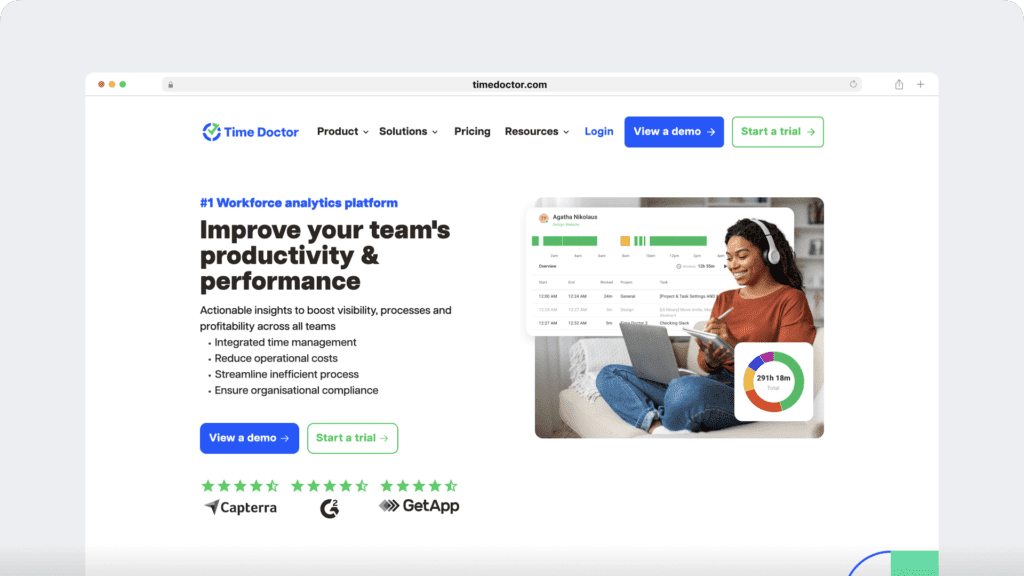
Time Doctor is the workforce analytics platform that empowers contractors and hybrid teams with the visibility to lead with trust, not control. By transforming time and activity data into AI-powered insights, it helps leaders make faster, smarter decisions, improve project profitability, and support accountability across every job site or setup.
Why it’s good for contractors: Time Doctor helps contractors gain real visibility into how work happens — across job sites, offices, and remote setups — without adding more admin or micromanagement. It’s designed for flexible, project-based teams that need accurate time data, transparent accountability, and easy payroll integration.
What to consider: When considering the positive aspects of Time Doctor, it’s important to recognize how the platform balances accountability and trust. It provides contractors and hybrid teams with clear visibility into how work gets done—through accurate time tracking, activity insights, and detailed reports—without crossing into surveillance. Features like screenshots, app and website usage analytics, and idle time tracking give managers actionable data to support performance coaching, job costing, and project planning. Employees can also view their own reports, promoting fairness and transparency that strengthens team trust and engagement.
The platform integrates seamlessly with 60+ tools—from accounting and payroll systems to project management apps—reducing manual work and eliminating duplicate data entry. It supports both online and offline tracking, making it ideal for mobile or remote contractors who work across different sites or clients.
2. Clockify
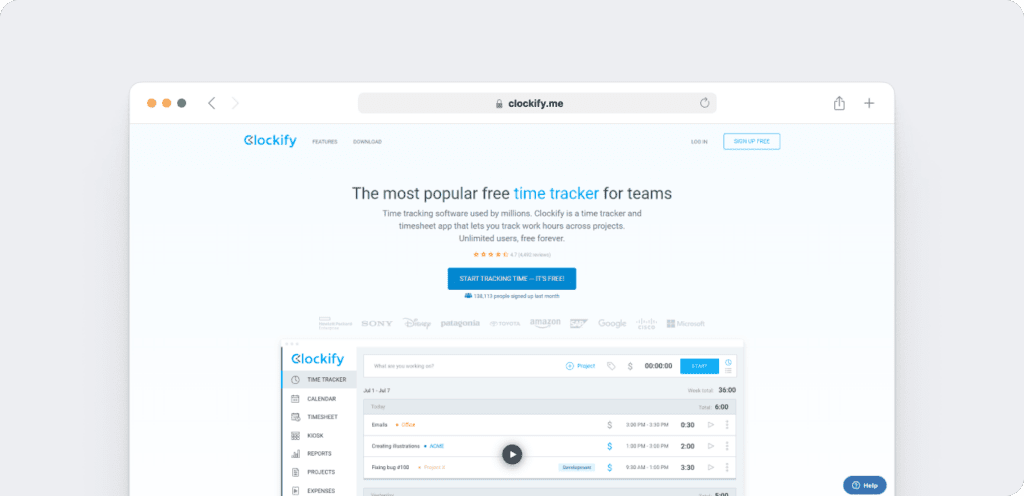
Clockify is free and flexible time tracker suitable for small teams.
Ideal for contractors working with small teams or multiple clients.
Ideal for contractors working with small teams or multiple clients.
Why it’s good for contractors: It helps track billable hours, monitor time across projects, and create clean reports for billing and job costing.
What to consider: Lacks more advanced features like screen monitoring or idle detection that larger teams may need.
3. Connecteam
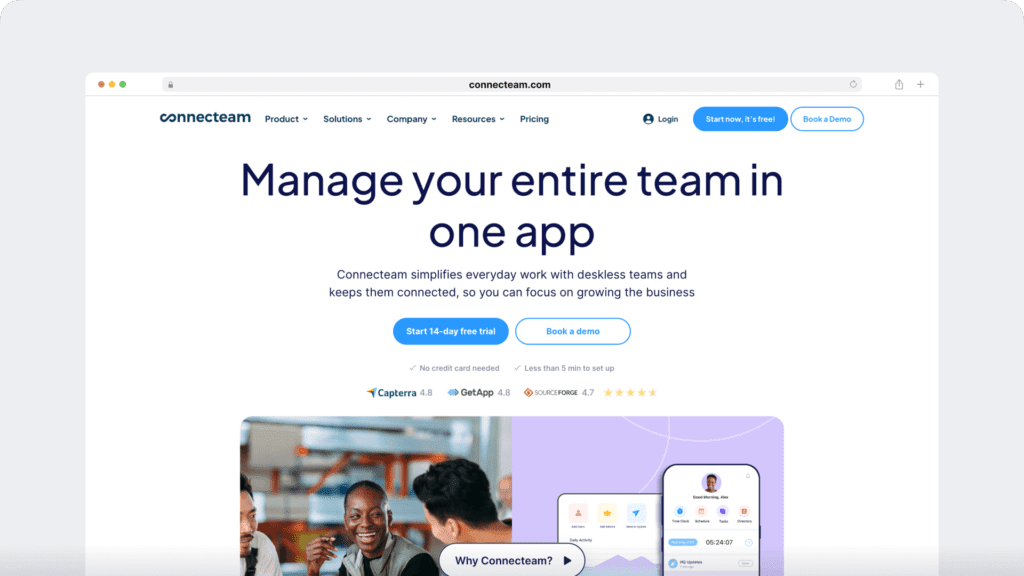
Connecteam is designed for job site teams, offering GPS tracking, kiosk mode, and mobile shift scheduling.
Best for contractors managing rotating crews and shared devices.
Why it’s good for contractors: It streamlines clock-ins, reduces buddy punching, and supports workforce planning across busy job sites.
What to consider: Some users may find the interface less intuitive when managing multiple job sites at once.
4. TimeCamp
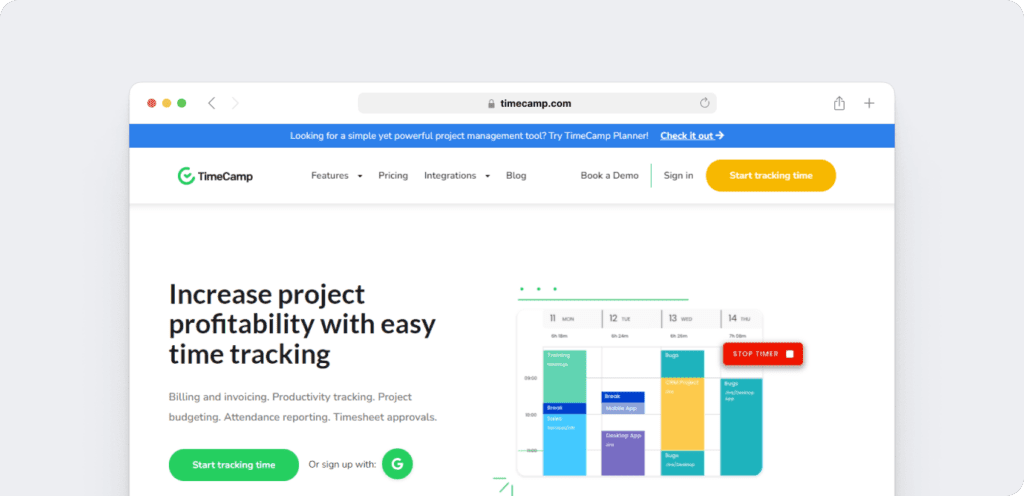
TimeCamp includes visual tracking tools and CRM integration.
Best for contractors balancing client work and internal tasks.
Why it’s good for contractors: It links hours to clients, automates invoicing, and supports team productivity with clear task tracking.
What to consider: Lacks built-in screen monitoring or GPS features, which may limit visibility for fieldwork.
5. QuickBooks Time
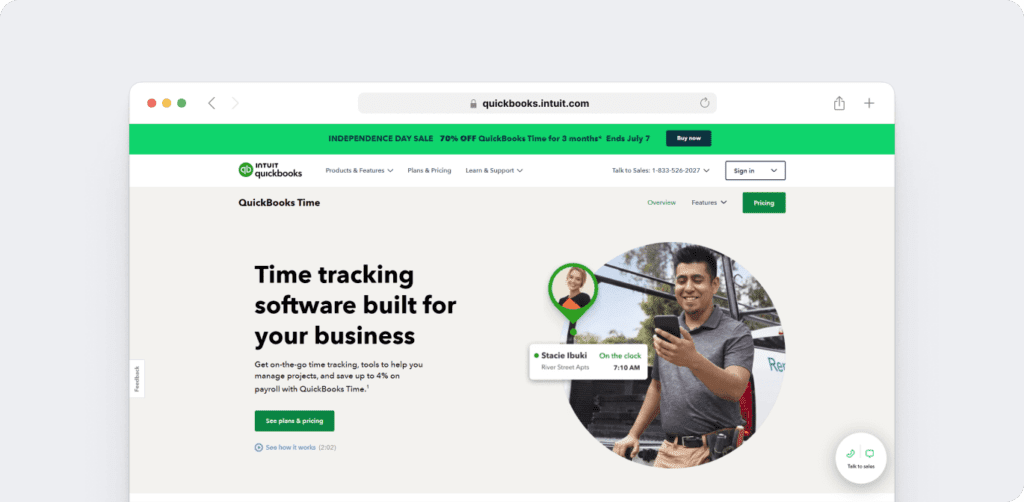
QuickBooks Time connects directly with your accounting system and payroll software.
Best for contractors already using QuickBooks.
Why it’s good for contractors: It keeps timecards, payroll, and job costing accurate and consistent, without requiring the use of multiple tools.
What to consider: May feel too tied to the QuickBooks ecosystem for teams who use different tools for invoicing or task management.
6. Harvest
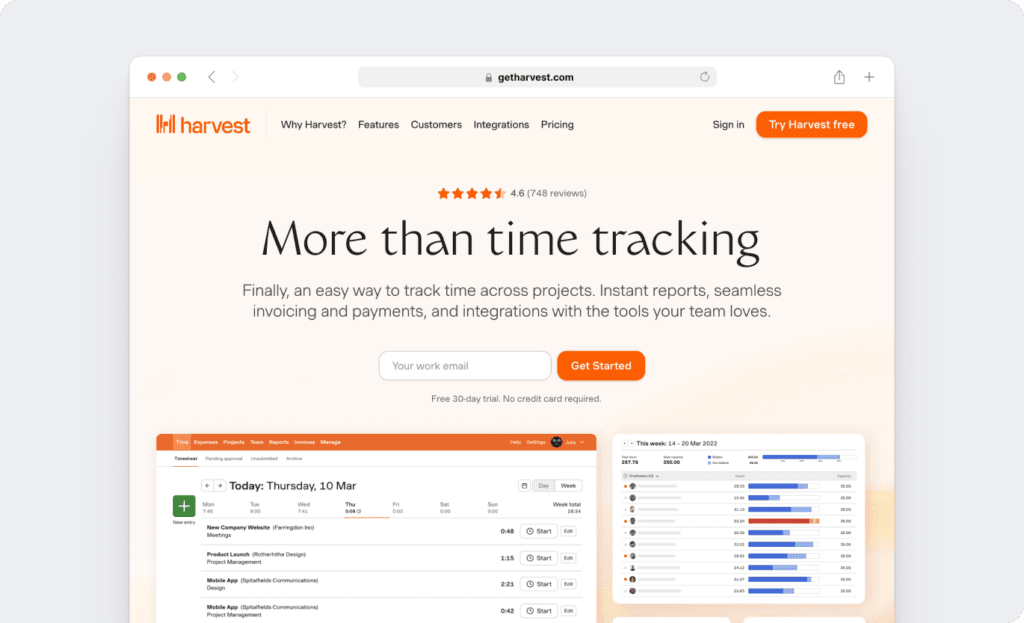
Harvest helps teams monitor project profitability with simple time tracking.
Best for contractors who need project-focused time and expense tracking.
Why it’s good for contractors: It tracks time by task or client, manages job costing, and creates easy reports for invoicing and budget reviews.
What to consider: It offers fewer team oversight features, so it may not be suitable for contractors managing larger crews.
7. Toggl Track
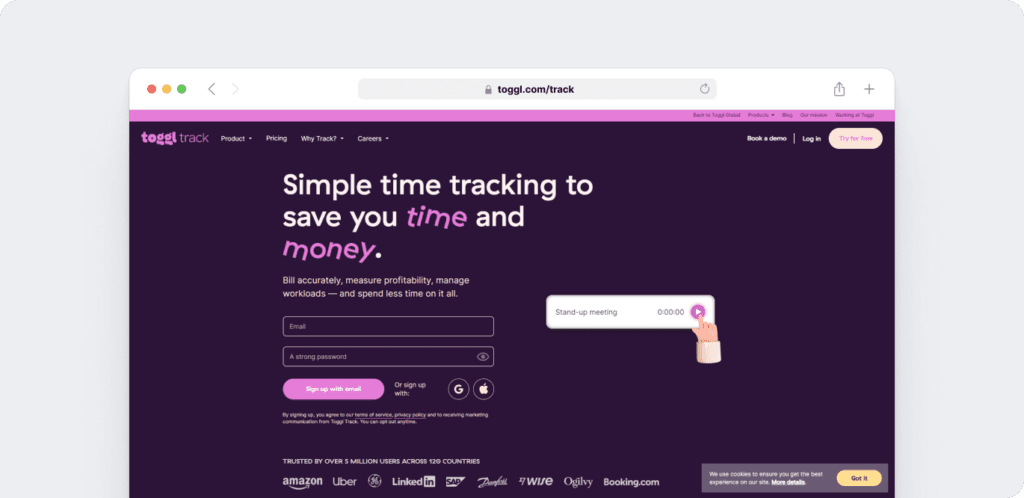
Toggl Track supports offline time tracking and device syncing.
Best for contractors working in remote areas or on the road.
Why it’s good for contractors: It allows time tracking even without internet access and syncs once you’re reconnected.
What to consider: It’s light on team management features, making it more suitable for solo users or small teams.
8. Memtime
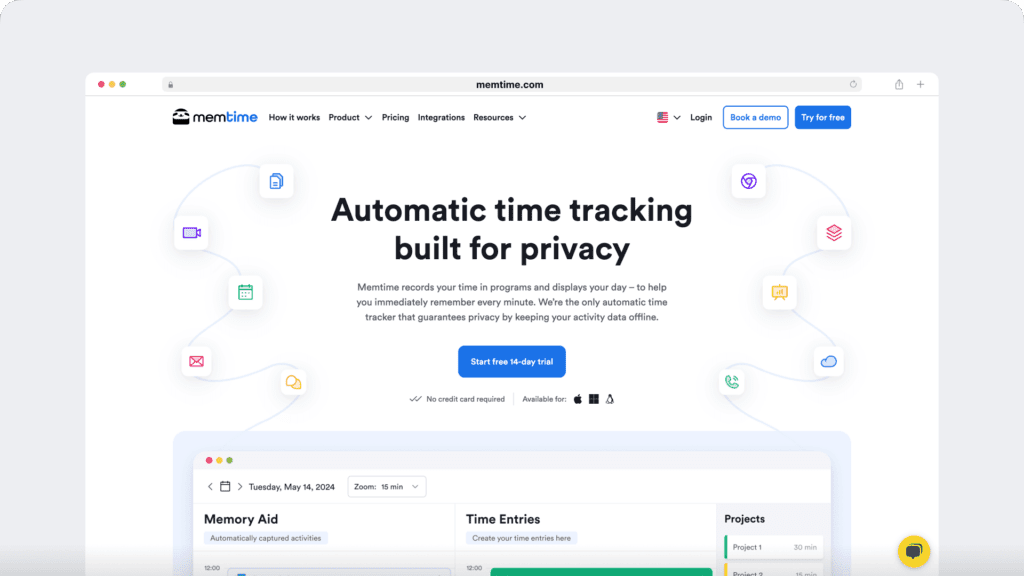
Memtime automatically tracks time in the background without manual input.
Best for freelancers or solo contractors.
Why it’s good for contractors: It captures all your work activity passively so you never miss a minute, even if you forget to clock in.
What to consider: Doesn’t include GPS, approval workflows, or screen monitoring, which may limit its use for team-based tracking.
9. Tracking Time
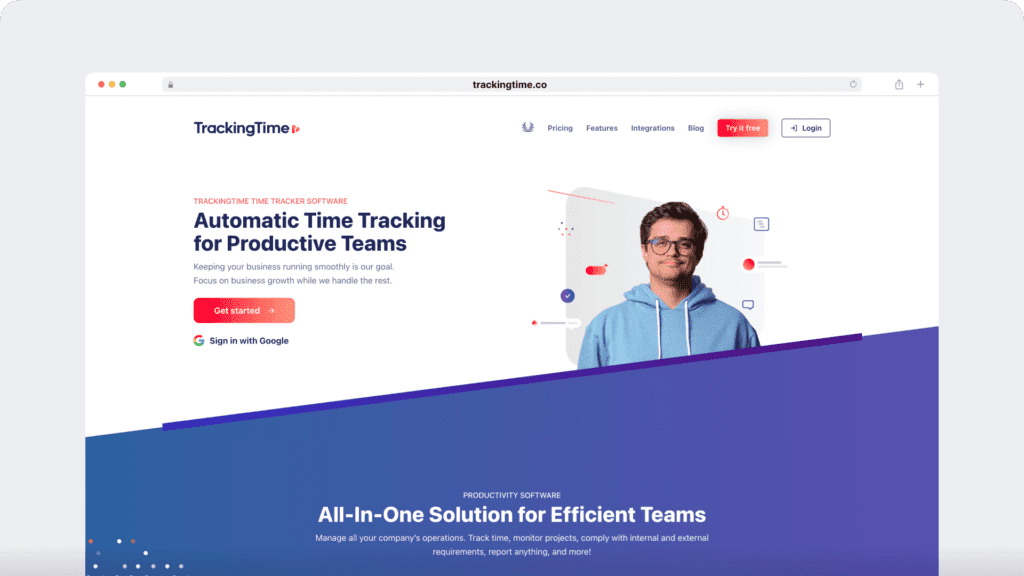
TrackingTime blends time tracking with task management tools.
Best for contractors managing admin, team coordination, and client projects.
Why it’s good for contractors: It keeps your hours, schedules, and communications all in one place with real-time visibility.
What to consider: Some users say the interface takes time to get used to, especially when managing complex task boards.
10. Timeular
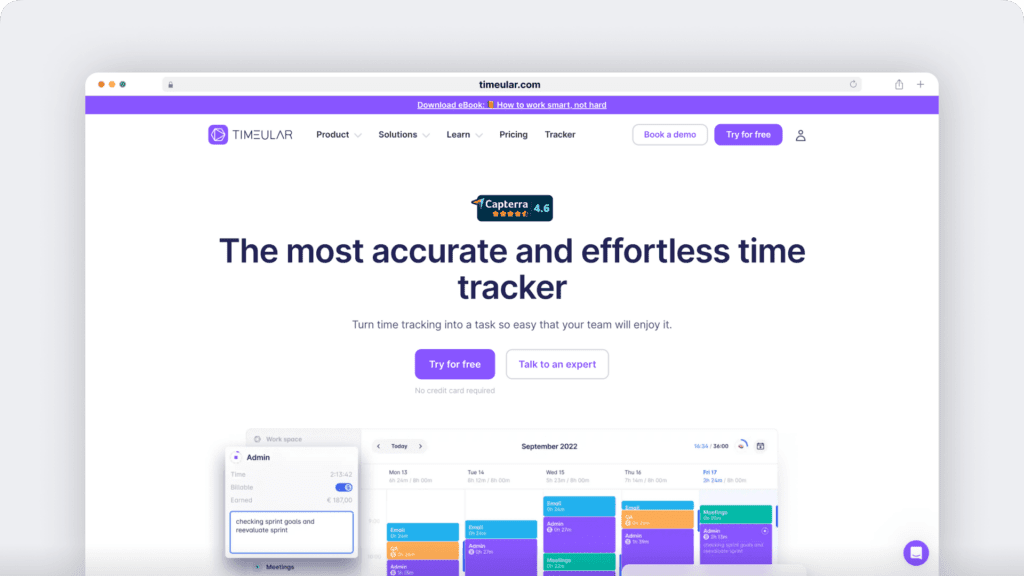
Timeular pairs a physical device with an intuitive digital app.
Best for contractors who prefer tactile tools for time tracking.
Why it’s good for contractors: It makes task switching simple, keeps time logs visual, and works well for office-based planning.
What to consider: This requires a separate physical tracker, which may not be suitable for every type of workflow or budget.
11. Procore
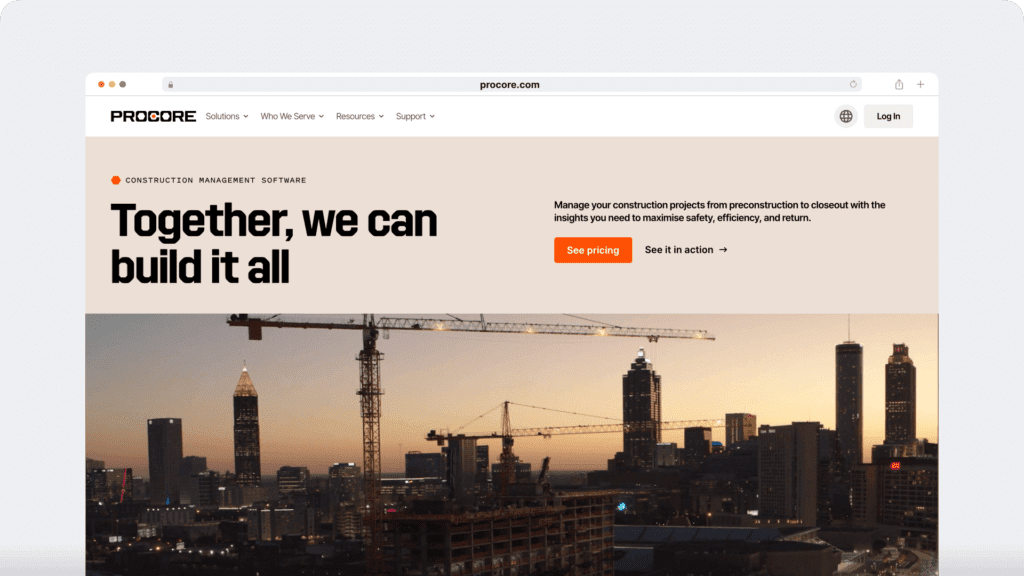
Procore is built for construction professionals who need more than just time tracking.
Best for contractors running large, complex projects.
Why it’s good for contractors: It combines timecards, safety tracking, team collaboration, and full construction time tracking in one platform.
What to consider: Comes with a higher price point and may be more than smaller contractors need for basic time tracking.
12. Jibble
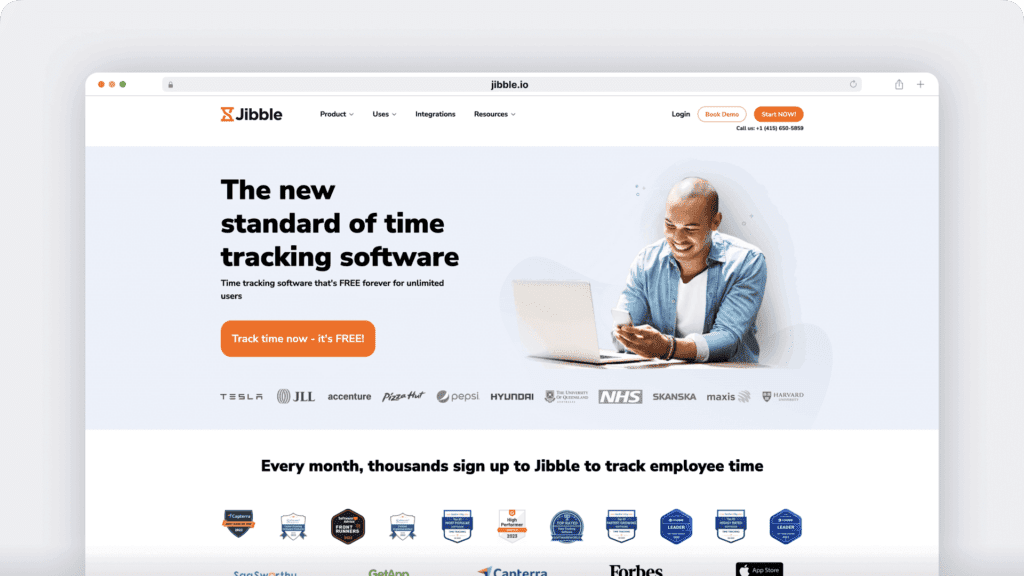
Jibble is a free tool with GPS, facial recognition, and mobile clock-in.
Best for contractors looking for reliable tracking on a budget.
Why it’s good for contractors: It prevents buddy punching, verifies job site attendance, and keeps time logs accessible across all mobile devices.
What to consider: Some features are limited in the free plan, so growing teams may eventually need to upgrade.
6 simple steps to integrate a time tracking app into your contractor workflow
Ready to make time tracking part of your daily work without the stress? If you manage teams across job sites, remote locations, or hybrid setups, you need more than a basic timer. You need a time tracking app for contractors that fits your exact process.
Here’s how to integrate it into your workflow and get your team on board fast:
Step 1: Start with a small pilot project
Begin with one team or job site to test the setup, collect feedback, and adjust workflows before expanding. A focused pilot helps uncover any setup or training gaps early.
Step 2: Set clear clock-in and clock-out rules
Explain how and when team members should log time — whether using timers, manual entries, or specific devices. Clear guidelines prevent confusion and ensure consistent data collection.
Step 3: Connect your payroll and project tools
Use integrations to sync the app with your payroll software, spreadsheets, and project management systems. This step reduces manual data entry and ensures your data remains accurate.
Step 4: Build templates for reports and timesheets
Create ready-to-use templates for timesheets, job costing, and invoices. This helps you expedite approvals, maintain accurate billing, and streamline compliance across your projects.
Step 5: Turn on approvals, alerts, and reminders
Enable idle time alerts, break reminders, and approval workflows to optimize productivity. These features help your team stay focused, avoid time loss, and maintain clean and easy-to-review records.
Step 6: Review your reports every week
Check your data weekly. Look at missed clock-ins, unapproved hours, or gaps in task progress. This provides you with the insight to enhance your contractor workflow and make more informed decisions more quickly.
Why Time Doctor is the best time tracking app for contractors
Time Doctor is more than a time tracking tool — it’s a workforce analytics platform that gives contractors real-time visibility into work hours, productivity, and project progress across any location or setup. By turning time data into actionable insights, it empowers hybrid, remote, and field-based teams to stay accountable, optimize performance, and make smarter decisions without added admin or micromanagement..
Here’s why it stands out:
- Accurate real-time time tracking across desktop, web, and mobile — with reliable offline support to capture hours even without internet access.
- Task-based timekeeping connects every minute to specific projects, clients, or deliverables, making job costing simple and transparent.
- Idle time detection and break reminders help prevent burnout and maintain healthy work habits.
- Activity-based verification ensures attendance accuracy and reduces time theft — every entry is tied to a verified user and device.
- Screen monitoring and web & app usage tracking offer actionable insights into how time is spent, helping teams improve productivity with trust and transparency.
- Get AI-powered benchmarks that compare focus, productivity, and workload trends across teams or projects. These insights help leaders identify best practices, spot performance risks early, and make data-driven decisions faster.
- See how collaboration time impacts productivity. Measure total meeting hours, engagement levels, and idle minutes to balance teamwork and focus, supporting healthier, high-performing teams with Meeting Insights.
- Custom time reports and easy approvals simplify payroll and billing — managers can review, approve, and export data in minutes.
- Automatic invoices and payroll-ready reports streamline admin tasks, ensuring contractors get paid accurately and on time.
- Seamless integrations with 60+ tools including QuickBooks, Xero, Trello, Asana, and more — connecting time data to your existing workflow.
- Clean, intuitive dashboard for at-a-glance visibility of total hours, labor distribution, and project status — perfect for quick decision-making.
Time Doctor helps contractors lead with trust, backed by data. It combines accurate time tracking, actionable insights, and simple workflows — so you can focus on completing projects profitably while empowering every team member to work smarter.
Final thoughts
Every minute counts when you’re managing contractors, job sites, and client deadlines. The right time tracking app doesn’t just record hours — it helps you understand where time goes, strengthen accountability, and protect profitability.
If you’re still relying on manual timesheets or inconsistent tools, it’s easy to lose valuable hours and visibility. A purpose-built solution like Time Doctor replaces that uncertainty with accurate, real-time insights into how work actually happens. You’ll simplify payroll, reduce time theft, and gain the clarity to lead with trust — not control.
Whether your team is on-site, remote, or hybrid, Time Doctor gives you the actionable visibility and transparency you need to keep every project on track and every hour accounted for. It’s time tracking built for trust, backed by data.
Ready to simplify your contractor workflow and track every hour with confidence?
Get a demo of the best time tracking app for contractors and see how Time Doctor can support your team on any job site, in the office, or on the go.
Frequently asked questions (FAQs)
A time tracking app for contractors is a digital tool that records work hours across job sites, remote locations, and hybrid teams. It helps contractors track billable time, manage approvals, streamline payroll, improve job costing, and generate accurate client invoices.
Contractors need a time tracking app to ensure accurate hours, avoid payroll errors, support fair billing, and simplify project management. It also helps eliminate manual timesheets, reduce administrative work, and provide clear visibility across distributed crews.
Yes. Time Doctor supports offline time tracking, so hours are still recorded on job sites or in low-signal areas and sync automatically when back online.
Yes. Time Doctor allows contractors to tag time to clients, tasks, and projects, helping calculate true labor costs, evaluate profitability, and make better project estimates.
Yes. Contractors can track time from mobile devices, desktop applications, or the web. The mobile app makes it easy for teams on the move to log hours and stay aligned.
A contractor time tracking app ensures every billable minute is captured, reduces missed clock-ins, and eliminates spreadsheet errors. Time Doctor also includes idle detection and reminders to support accurate records and healthy work habits.
Look for enterprise-level certifications like:
• ISO 27001:2022
• ISO 27701:2019
• SOC 2 Type 2

Carlo Borja is the Content Marketing Manager of Time Doctor, a workforce analytics software for distributed teams. He is a remote work advocate, a father and an avid coffee drinker.
